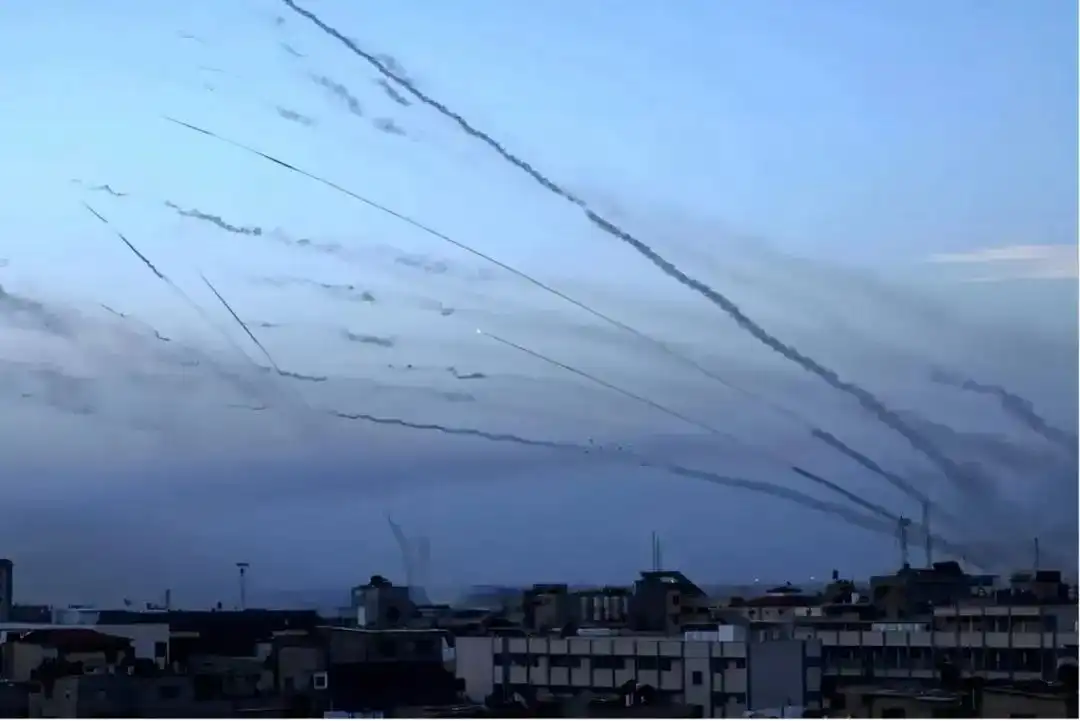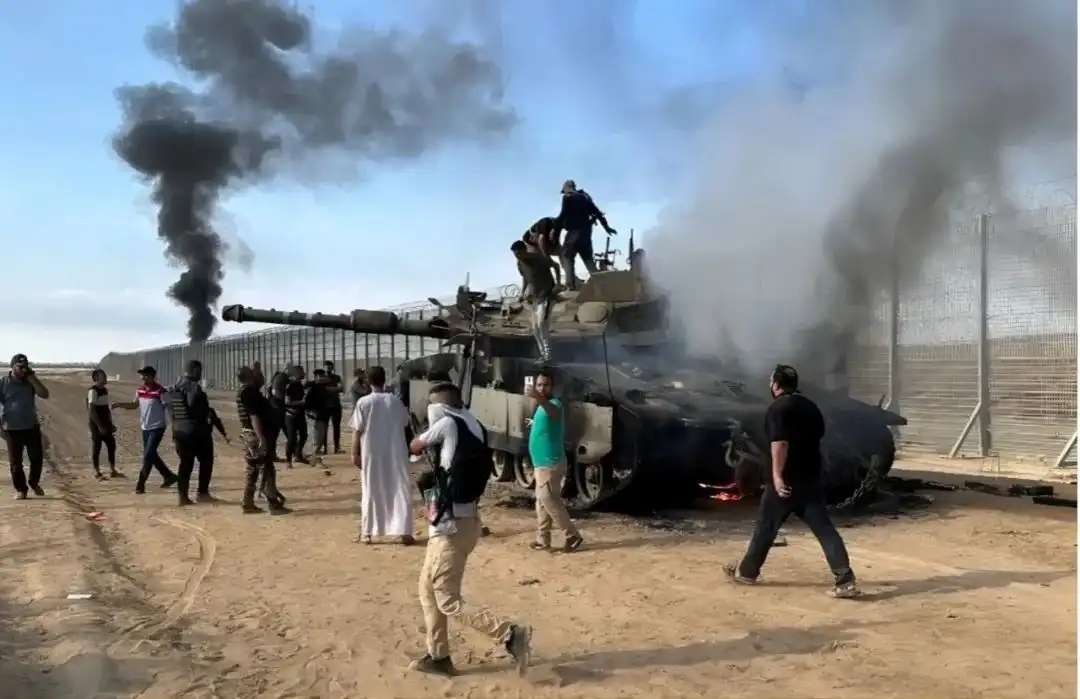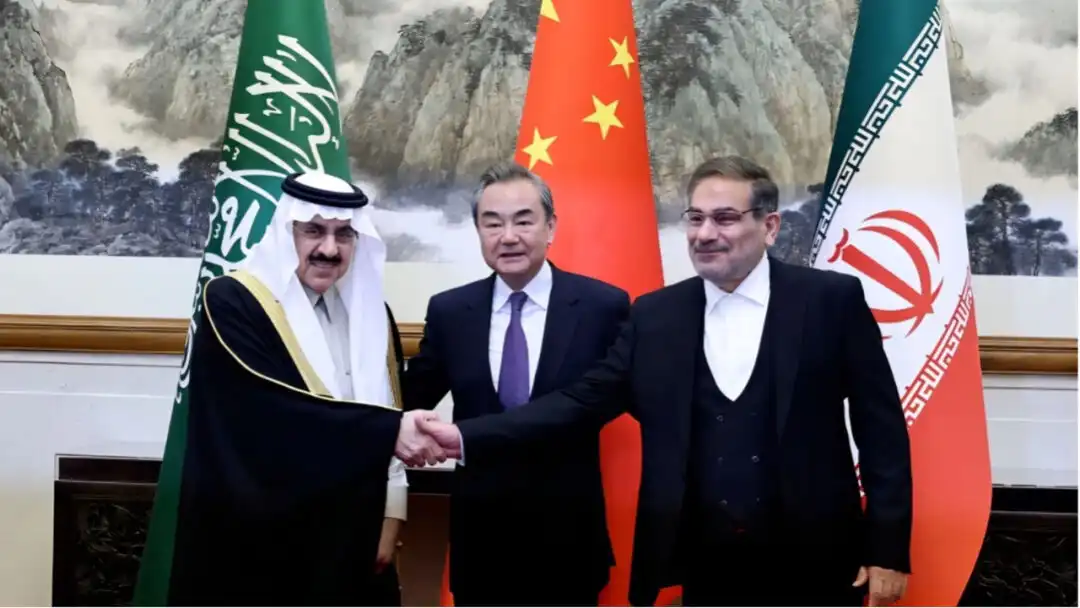The complexity of Israeli intelligence failures:Analysis from the Perspective of Ontology, Epistemology and Systems Theory

During the Palestinian-Israeli conflict that broke out on October 7, 2023, Israel made serious intelligence errors, causing heavy losses in the early stages of the conflict. This paper attempts to analyze and explain the reasons for Israel's intelligence early warning failure in the face of complexity issues from the perspective of ontology, epistemology, and systems theory, and summarizes lessons and enlightenment.
Complexity has become an important perspective on intelligence issues
With globalization, advances in communication technology, and changes in the international order, the world has increasingly formed a complex system that is closely connected and interdependent. In this context, military science has also completed a complex turn in the past 20 years, and war is increasingly seen as complex. However, military intelligence has not entered the perspective of complex systems for a long time, and few people have paid attention to the complexity and adaptability of intelligence.
Complexity is an attribute that describes objective things. Its connotation is rich and there is no consensus. It can be divided into three types according to different perspective.:First, based on an ontology perspective, complexity can be understood as the state formed by a large number of different elements with many different connections between each other, emphasizing that things have numerous and messy components; second, based on an epistemological perspective, complexity can be defined as describing the difficulty of an objective thing, which is largely influenced by the subject's cognition; Third, based on the perspective of system theory, complexity can be defined as the "edge of chaos", that is, complexity is the state between a strictly ordered system and a disorderly system. A complex system is a large number of dynamically changing and interacting elements or subsystems. A comprehensive system composed of systems.
Based on the above definition, intelligence can also be regarded as a complex system with significant complexity characteristics:It is composed of many and complex departments and institutions; the judgment of the object is largely influenced by subjective cognition; for the subject, the state of the opponent can be regarded as a chaotic system. Introducing the concept of complexity into intelligence issues with the help of situational case analysis helps to improve the traditional cybernetic methods of intelligence science and deeply reflect on the mistakes and shortcomings of intelligence activities and organizations.
Hamas 'raid and Israel's failure in early warning
At about 7 a.m. on October 7, 2023, the Palestinian Resistance Movement (Hamas) began to fire about 5000 rockets intensively into southern and central Israel, and air defense sirens sounded in many areas in southern and central Israel. Under the cover of rockets, Hamas militants drove paragliders to break through the Palestinian-Israeli border; after landing, the cover commando used bulldozers to break through the impermeable electronic and cement walls built by Israel, used explosives to break through obstacles, widen the gap, and break through the Israeli army's blockade in the Gaza Strip; then they used motorcycles, speedboats and other tools to penetrate into many towns and villages in southern Israel from multiple directions on land, sea and air. On the same day, Hamas announced that the attack on Israel was Operation Al-Aqsa Flood. Foreign media defined the raid as a major intelligence error by Israel, calling it Israel's "Pearl Harbor Incident" and "9.11 moment."

A large number of rockets were fired from the Gaza Strip into Israel
There were huge casualties and equipment losses. 冲突爆发仅4天,以方就有包括200名军警武装人员在内的1200人死亡、3400人受伤,另有200余人被哈马斯劫持为人质。哈马斯还俘虏了以色列少将尼姆鲁德·阿洛尼、中央特种部队指挥官谢霍夫·索拉姆等高级军官。以军在遭遇袭击的72小时内损失的军官数量之多、级别之高,在其建国以来的历史上堪称罕见。装备损失方面,在短短一两天内,加沙周边的以军至少损失了梅卡瓦主战坦克(9辆)、雌虎和M113在内的数十辆装甲输送车,以及更多的轻型轮式战术车辆。这样的规模对于被全世界公认为低烈度治安作战区域的加沙地带而言,损失不可谓不大。

Israeli army Merkava IVM tank burned
The effectiveness of counterattack is very limited. 此次冲突中,以色列对加沙的反击在摧毁或破坏军事阵地、人员和基础设施等方面的效果有限。以色列声称已经杀害了一些激进分子领导人,其中包括一些来自哈马斯的精英努赫巴部队,并努力打击火箭发射基础设施。但哈马斯和其他武装分子在以军的反击下,仍继续向以色列发射了千余枚火箭弹,只是炮弹的规模和强度都不及10月7日。并且炮火强度的减弱,也不完全受以色列回击的影响;其进攻强度的变化,同样受卡桑旅的库存弹药不足、哈马斯的指挥决策影响。以方的反击效果不佳,说明之前对哈马斯的组织、位置与动向情报储备不足。
Officials and media directly targeted the intelligence department. 以色列领导人以及军方相关人士,在各种场合公开表达了对情报力量的不满。以色列安全部门前高级别官员雅科夫·阿米德罗尔告诉媒体,以色列遇袭反映出“情报系统和(以色列)南部军事机构的巨大失败”,并表示“这次行动实际上证明加沙的(情报)能力并不好”。以色列总理内塔尼亚胡在社交媒体上表示,袭击发生前他并没有收到任何有关警告,“相反,所有的国防官员都评估,哈马斯被吓倒了”。美国有线电视新闻网、纽约时报、英国卫报、半岛电视台等媒体,也直指情报界犯下的若干错误,包括未能监控巴勒斯坦袭击者的主要通信渠道,过度依赖脆弱的边境监控设备等。官方发声与媒体讨论同时指向了以色列情报部门履职不力,在舆论上间接证明了其失误。
Analysis of the reasons for Israel's mistakes:Neglect of intelligence complexity
Ontology perspective:Hamas's undetectable organizational activities and remarkable intelligence fraud. 从本体论视角分析,以色列的情报失误是由哈马斯隐匿的组织结构与活动、出色的情报欺骗导致的。一方面,哈马斯作为非政府激进组织,本身组织结构具有极强的复杂性和隐匿性,其行为活动的探察难度大;另一方面,哈马斯历时两年,对以色列实施了成功的M式欺骗(误导欺骗)。
First, organizational activities are highly concealed, making it difficult for Israel to detect and predict. Hamas 'own complexity and concealment also make Israel's intelligence prediction of its raids extremely difficult. As a non-state actor and a non-governmental organization, Hamas 'own organizational structure and operating mechanism lack transparency and are difficult to be familiar with. Being in the Gaza Strip, where conflicts occur frequently, it has prompted it to adopt a hidden mode of action for a long time, making reconnaissance and prediction difficult.
On the one hand, Hamas is secretive about its leaders and organizational structure. In order to prevent the United States and Israel from grasping the positions of political leaders in their organizational structures and carrying out precision strikes and targeted killings, such information is strictly controlled and protected. Mohammed Dave, the planner of the "Al-Aqsa Floods" operation and leader of the Qassam Brigade, is even more volatile. There is only one vague photo of him in public information. His nickname "Dave" means "guest" in Arabic, meaning that he "spends the night in a different house every night to avoid Israeli intelligence personnel." This shows that Israel has great difficulties in grasping the situation and movements of Hamas leaders.

The only public photo of "Dave" was taken around 2000 and the location is unknown
On the other hand, as a non-state actor, Hamas is not restricted by the transparency of government organizations and lacks publicity mechanisms in fiscal, budget, and settlement aspects, which makes it difficult for Israel to judge its activities by monitoring its fiscal budget, project settlement, etc. Track and next steps. The watchdog organization Freedom House once said:"Hamas-controlled governments have no effective or independent mechanisms to ensure transparency in funding, procurement or operations."
Second, implement M-type deception to mislead Israeli intelligence and judgment. Through various means, Hamas successfully concealed various signs of pre-raid preparations, making Israel firmly believe that Hamas would not take the initiative to seek force, and therefore lacked emergency measures.
First of all, it successfully conveyed to Israel their willingness to participate in a new round of conflict and convinced Israel. Hamas has not taken the initiative to provoke the war in Gaza for more than two years since the May 2021 attack; even a month before the conflict broke out, Hamas agreed, mediated by Qatar, to end a unrest on the Israel-Gaza border. Israeli national security adviser Chachi also said in an interview with the media the week before the raid:"Hamas is very restrained and they understand the consequences of further provocation."
Secondly, strict confidentiality measures have been implemented. Egyptian intelligence officials said Hamas closely controlled the scope of knowledge of the raid plan and divided the plan into several parts, each with extremely limited dissemination. During the training period, the 1000 soldiers who carried out the attack had no knowledge of the purpose of the exercise, and the commandos received precise orders only three hours before the action. In addition, since many Hamas political leaders have been in exile outside the Gaza Strip for many years, in order to prevent information from leaking, the scope of the raid plan will even exclude these senior political leaders.
Third, carefully determine the time of the raid. Hamas has scheduled the attack for October 7, 2023, the last day of the Sabbath and Sukirk Festival for Israeli Jews. The country is still immersed in an atmosphere of vacations and festivals. On this day, it is easy for intelligence departments to relax their vigilance, there are fewer border guards, and the risk of a raid is low and the probability of success is high.
Epistemological perspective:Israel's erroneous assessments and perceptual biases in complex cognitive processes. 从认识论视角解析,此次突袭可以理解为以色列复杂认知过程中因判断失误招致的攻击,换言之,是防御方的认知偏差在累积效应的作用下,导致的一种综合的心理和物理结果。与其说突袭的成功是欺骗的结果,不如说是自欺所致。以色列情报部门低估了哈马斯武装组织的威胁程度,产生知觉偏差,又因知觉偏差忽略了预警征候,导致最终的失误。

The Israeli-Palestinian rift is deep and difficult to bridge
First, it failed to assess Hamas 'relative capabilities. Israeli intelligence only focused on Hamas 'absolute capabilities to launch attacks, while ignoring the assessment of the relative capabilities of enemy and enemy. In other words, it did not compare Hamas's attack capabilities with its own defense capabilities to determine whether Hamas was capable of launching a successful raid. In fact, after years of weapons renewal and training, although Hamas is still unable to compete with Israel and win the entire war, it has quietly acquired the ability to launch a successful raid.:In recent years, it has continuously enriched rocket models and optimized performance parameters such as charge and range. Currently, rockets have been systematized and precise; at the same time, with the support of Iran, Hamas has the ability to produce small batches of suicide drones. In terms of training, it has built a training area modeled after Israeli military camps to simulate various special attack training such as rocket launches, paraglider take-off and landing.
On the other hand, Israel does not actually have absolute advantages in its defense forces on the Gaza border. First of all, before the conflict broke out, a wave of violence appeared in the West Bank. The judicial reform of Netanyahu's far-right government also triggered a wave of protests and demonstrations, causing the transfer of some military resources and the dispersion of military forces originally invested in Hamas. Secondly, although the Iron Dome air defense system, which once shone in the Palestinian-Israeli conflict in 2021, is effective, it is limited by the expensive price of tens of thousands of dollars per interceptor and the system detection radius of only 150 kilometers. Its comprehensive deployment cost is too high., it can only be deployed sporadically around key towns and facilities, and the defense effect is greatly reduced. Third, Israel trusted too much the electronic surveillance equipment deployed on the Gaza border, but from the results, Hamas destroyed the surveillance equipment and remote-controlled weapon stations with only small drones mounted grenades. Taking Hamas's attack capabilities into account with Israel's defensive capabilities, Israel is not as comfortable as its intelligence agencies assess.
Second, they were misled by past experience and misjudged Hamas's true intentions. When assessing its intentions, Israeli intelligence services put too much faith in the experience of previous Middle East wars and previous Palestinian-Israeli conflicts. Intentional assessment requires understanding the other party's basic goals, plans (i.e., possible courses of action), and determination (i.e., how much they are willing to take risks). Although the Israeli intelligence service understood Hamas's basic goals, it did not anticipate its action plan and determination, making the mistake of empiricism and blind obedience to intuition, and thus showed obvious deviations in predicting the timing of specific raids.
On the one hand, Israeli intelligence underestimated Hamas's determination and willingness to retaliate. Intelligence agencies 'assessment that Hamas will not launch a surprise attack stems from the economic incentives Israel is providing to the Gaza Strip. It believes that by providing economic benefits, Hamas's intentions have softened. In fact, Abu Ubaida, spokesman of the Qassam Brigade, said that the concept of the "Al-Aqsa Flood" operation had been produced as early as 2021. For Hamas, reconciliation with Israel is obviously a short-term tactical rather than a long-term strategic act. The conflict between the two sides remains profound and difficult to resolve, and reconciliation is only a delaying tactic.
On the other hand, Israeli intelligence also ignored Hamas's internal and external difficulties. Before the conflict broke out, Hamas was in a situation of internal and external difficulties and increasing isolation. The latest survey by the survey agency Arabometer shows that in the Gaza Strip, only 29% of people trust the Hamas government, and only 24% said they would vote for Ismail Hanyeh. Internationally, due to the Abraham Agreement, the Palestinian issue has been put aside. Hamas is likely to want to provoke an overreaction from Israel to hinder the "normalization" of Arab-Israeli relations and make it difficult for the US-brokered Saudi-Israeli peace agreement negotiations. Israeli intelligence agencies have underestimated Hamas 'determination to reverse its diplomatic isolation.
Third, ignore key indicators before the raid. Misjudgment of Hamas 'capabilities and intentions has created a mindset and false expectations among Israeli intelligence analysts, which in turn restrict perceptions and make it difficult for them to notice information and signals that contradict expectations. Once expectations are formed, it will be difficult to detect or believe it even if there are subsequent signs that Hamas is about to launch a raid. Important early warning signs that emerged before the raid were ignored due to cognitive bias among Israeli intelligence analysts.
Although Hamas has flatly denied the intention of the raid, carried out deception, and used secrecy, there are still some signs of pre-raid. Previous perceptual biases caused by biases in assessments of capabilities and intentions have led Israeli intelligence analysts to underestimate and ignore evidence that contradicts earlier judgments, and tend to confirm assessment evidence that is already available. A CNN survey analyzed promotional videos and satellite images that showed that multiple Hamas training camps in the Gaza Strip have been expanding in size and number over the past two years. When questioned, an IDF spokesman claimed that this was "nothing new." Israeli analysts have only "seen" what they have seen before-the expansion of training and are not convinced that Hamas is about to launch an attack or raid.
Systems perspective:Repositioning and differences in outlook preferences under changes in the international environment. 2023年3月起,以沙特与伊朗恢复外交为标志,中东地区迎来和解大潮。阿拉伯世界中逊尼派与什叶派国家的关系、土耳其与阿拉伯国家的关系、海湾合作委员会内部关系等,都出现了对话、缓和的积极互动,中东地区出现罕见的和解热潮。面对地区格局发生重大变动,哈马斯与以色列都需要在动态变化的国际体系中,重新找寻各自的定位。

Saudi Arabia and Iran resume diplomatic relations
Prospect theory shows that decision makers 'preference for predicting things or events depends on how they frame the problem. If a change in the event relative to the original reference point is regarded as a loss, then policymakers tend to avoid risk; conversely, if the change is regarded as a gain, then policymakers seek risk. When the subject has the above tendency, this tendency will affect the subject's decisions, causing it to prefer options that can help it achieve "loss avoidance". Hamas and Israel have different preferences for the prospects of the Palestinian-Israeli issue, and differences in prospects preferences bring about differences in prediction preferences. Hamas believes that there are benefits from the intensification of the Palestinian-Israeli conflict, so it tries its best to promote it; Israel assesses it as a loss and wants to avoid the outbreak of the conflict.
First, Hamas has become a risk lover, taking a chance to return the Palestinian-Israeli issue to the international focus. Hamas has a strong sense of insecurity in the face of the tide of reconciliation in the Middle East. The contradictions between Israel and the Arab world and intra-Arab countries led to the division of the Middle East, brought a power vacuum and laid the foundation for the existence and development of Hamas. In the past, the Palestinian-Israeli issue was a major focus of contradictions in the Middle East, and it is with the help of this contradiction that Hamas continues to receive funding from Iran and other countries. With the gradual reconciliation between Sunnis and Shiites, and the United States taking the opportunity to promote the further relaxation of relations between Israel and Arab countries, the conditions for the existence of Hamas, the contradictions between countries in the Middle East, are gradually being eliminated. When the Palestinian-Israeli issue is marginalized, the world's attention is no longer focused on Palestine, Hamas loses its use value, and may be faced with strategic abandonment by Iran and other donors and gradual encroachment by Israel. Therefore, in the face of the trend of "marginalization of the Palestinian-Israeli issue", Hamas chose to seek risks, take a chance, and launch a strategic raid to push the Palestinian-Israeli conflict back to the international focus.
Second, Israel has become a risk-averse person, maintaining the status quo and preventing the Palestinian-Israeli problem from heating up again. For Israel, it is a profitable choice to maintain the status quo of the Palestinian-Israeli issue and prevent the situation from heating up again. Since February 2023, Israeli Prime Minister Benjamin Netanyahu has carried out judicial reform to cater to the right and far-right forces to suppress the left-wing Supreme Court, in an attempt to suppress the left forces in the country by weakening the power of the Supreme Court and judicial independence. With the rise of Israeli populism and the government's decision-making, the far-right forces continue to antagonize Iran while continuing to nibble away at expansion in the Palestinian areas, making the entire Arab world feel uneasy and finally leading to reconciliation between Saudi Arabia and Iran. And Shai reconciliation will make the ethnic contradictions between Arab countries and Israel more prominent, which Israel and the United States do not want to see. Therefore, with the mediation of the United States, the Saudi-Israeli peace talks have also been put on the agenda. Under the circumstances that both Saudi Arabia and Israel intend to ease relations, Israel does not want to have fierce conflicts with Hamas, which will further stimulate the Arab world represented by Saudi Arabia and intensify ethnic contradictions. Therefore, Israel believes that the intensification of the Palestinian-Israeli issue is a loss to itself and should be avoided as far as possible.
conclusions
The above cases show that intelligence issues are becoming more and more complex at a time when traditional and non-traditional security threats are intertwined and adversaries are becoming increasingly blurred. We need to break down stereotypes, carefully consider the characteristics of non-state actors, and conduct in-depth studies on their motivations and behavioral patterns; continuously expand the cognitive framework and focus on gradual and spontaneous decentralized accidents; at the same time avoid relying on specific intelligence methods and attach importance to All-source intelligence analysis. In this process, integrating complexity thinking theory into intelligence issues will help improve the traditional cybernetic thinking in intelligence science, avoid over-simplifying related issues, promote multi-angle examination of issues, and provide useful reference for intelligence research.
to
period
back to
Gu
copyright notice:This article was published in the 4th issue of Military Digest magazine in 2024. The author:Wang Ruoyu, If you need to reprint it, please be sure to indicate "Transferred from Military Digest".
attention to our

